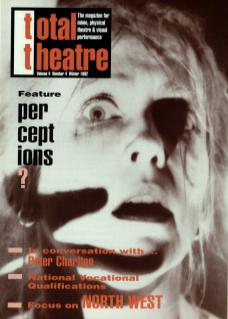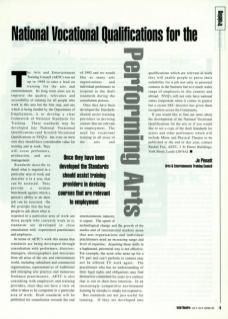The Arts and Entertainment Training Council (AETC) was set up in 1989 to take a lead on training for the arts and entertainment. Its long-term aims are to improve the quality, relevance and accessibility of training for all people who work in this area but the first step, and one which is being funded by the Department of Employment, is to develop a clear framework of National Standards for Training. These standards may be developed into National Vocational Qualifications (and Scottish Vocational Qualifications or SVQs) but even on their own they should have considerable value for training and at work. They will cover performers, production, and arts management.
Standards describe in detail what is required in a particular area of work and describe it in a way that can be assessed. They provide a written benchmark against which a person's ability to do their job can be assessed. On the principle that the best people to ask about what is required in a particular area of work are those people who currently work in it, standards are developed in close consultation with experienced practitioners and employers.
In terms of AETC's work this means that standards are being developed through consultation with performers, directors, managers, choreographers, and musicians from all areas of the arts and entertainment world, including subsidised and commercial organisations, representatives of traditional and emerging arts practice and numerous freelance practitioners. AETC is also consulting with employers and training providers, since they too have a view on what it takes to be competent in a particular area of work. Draft standards will be published for consultation towards the end of 1992 and we would like as many arts organisations and individual performers as possible to respond to the draft standards during the consultation process.
Once they have been developed, the Standards should assist training providers in devising courses that are relevant to employment. The need for vocational training in all areas of the arts and entertainment industry is urgent. The speed of technological change and the growth of the media and of international markets mean that arts organisations and individual practitioners need an increasing range and level of expertise. Acquiring these skills in a haphazard, piecemeal way is not effective. For example, the actor who turns up for a TV part and can't perform to camera may not be offered TV work again. The practitioner who has no understanding of their legal rights and obligations may find themselves committed for years to a contract that is not in their best interests. In an increasingly competitive environment learning by mistake is simply too expensive.
But standards are not just useful for training. If they are developed into qualifications which are relevant at work they will enable people to prove their suitability for a job not only to personal contacts in the business but to a much wider range of employers in this country and abroad. NVQs will not only have national status (important when it comes to grants) but a recent EEC directive has given them recognition across the Community
If you would like to find out more about the development of the National Vocational Qualifications for the arts or if you would like to see a copy of the draft Standards for actors and other performers, which will include Mime and Physical Theatre, to be published at the end of this year, contact Rachel Fox, AETC, 3 St Peters Buildings, York Street, Leeds LS9 8AJ.

